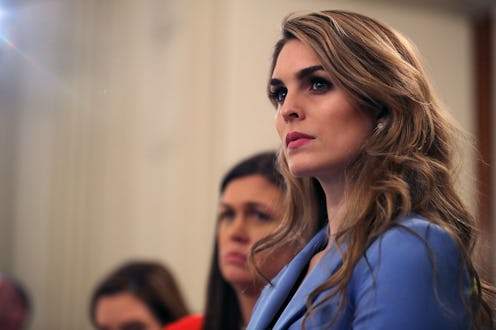News
Here's What Could Happen To Hope Hicks If She Doesn't Cooperate With Congress

Congress has subpoenaed documents from one of Donald Trump's former aides — but according to CNN, the White House is telling her not to hand them over. Now, Hope Hicks' subpoena deadline is here. Federal law explicitly states that anyone who defies a Congressional subpoena can be jailed and fined, but the White House claims that it has the authority to block Hicks' testimony and submission of documents via executive privilege.
The House Judiciary Committee subpoenaed documents from Hicks, a former top aide to Trump, as part of its investigation into possible obstruction of justice, corruption, and abuse of power by Trump's team, and asked her to testify before the committee. Although her testimony isn't scheduled until June 24, the deadline for Hicks to comply with the subpoena for documents is Tuesday. Trump has denied all obstruction of justice accusations.
However, CNN reports that the White House has ordered Hicks not to hand over documents relating to her work in the Trump administration. Bustle has reached out to the White House for comment.
"Those documents include White House records that remain legally protected from disclosure under longstanding constitutional principles, because they implicate significant Executive Branch confidentiality interests and executive privilege," White House Counsel Pat Cipollone wrote in a letter, according to CNN. According to TIME, Cipollone claimed in the letter that Hicks — and another former aide who's been subpoenaed, Annie Donaldson — "do not have the legal right" to turn in the requested documents.
In March, before Hicks was subpoenaed, House Judiciary Committee Chair Jerry Nadler claimed that Hicks had agreed to hand over documents that the committee had requested. Nadler reiterated this on Tuesday after it was reported that the White House had instructed Hicks to defy the subpoena.
"I note that Ms. Hicks has agreed to turn over some documents to the Committee related to her time working for the Trump Campaign, and I thank her for that show of good faith," Nadler said in a statement.
As NPR reports, the White House has argued publicly and privately that it can use executive privilege to block the subpoena — although as CNN notes, it has not formally asserted executive privilege with regard to the subpoenas. In any event, Nadler disagrees, writing in his statement that "federal law makes clear that the documents we requested—documents that left the White House months ago—are no longer covered by executive privilege, if they ever were."
So, what will happen to Hicks if she doesn't comply with the subpoena she's been issued?
Federal law is pretty clear on the matter. U.S. Code, Title 2, Section 192 reads as follows:
Every person who having been summoned as a witness by the authority of either House of Congress to give testimony or to produce papers upon any matter under inquiry before either House, or any joint committee established by a joint or concurrent resolution of the two Houses of Congress, or any committee of either House of Congress, willfully makes default, or who, having appeared, refuses to answer any question pertinent to the question under inquiry, shall be deemed guilty of a misdemeanor, punishable by a fine of not more than $1,000 nor less than $100 and imprisonment in a common jail for not less than one month nor more than twelve months.
If Hicks defies the subpoena as the White House is requesting, it's possible that she could be fined at least $100 and jailed for at least a month. She could also be held in contempt of Congress: When asked Tuesday whether the House would hold Hicks in contempt if she didn't comply with the subpoena, he replied, "I assume so," according to CNN.
The White House has ordered other former and current top administration officials to defy subpoenas from Congress. Former White House Counsel Don McGahn was subpoenaed by the committee but didn't appear for his testimony because the White House told him not to, and Attorney General William Barr did the same after getting subpoenaed himself. The Judiciary Committee is in the process of holding Barr in contempt for his refusal to appear.